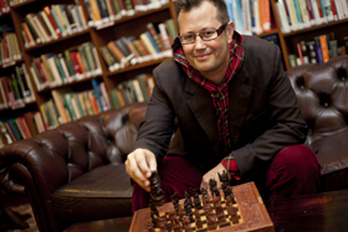 Bryce Edwards puts Mike Bush in check. Bush kicks the board over.
Bryce Edwards puts Mike Bush in check. Bush kicks the board over. So, what’s the truth?
Edwards took his concern from a number of high-profile police errors, including the ‘Roast Busters’ issue, the Urewera Raids and several troubling convictions and cases.
These are not just Edwards’ concerns, they are problems reported by many including an important report by Dame Margaret Bazley as well as the Privy Council. For my money, he could have focused on one specific example: a swab of David or Robin Bain’s hands and arms for gunshot residue would have concluded one of the country’s most recent ‘whodunnits’. That one test was not done and it has cost the country justice (and millions of dollars).
At times, though, Edwards drew a long bow and one might argue that his tenor was overly harsh. Certainly, he used some data he shouldn’t have, most specifically his use of a phone-in TV3 poll was astonishing. That’s about as scientific as the Bible.
Commissioner Bush did, then, have some ground to play with. A right of reply was called for and given. The police have made noteworthy improvements in certain areas, some of which I spoke of when reviewing the Louise Nicholas book for Metro.
Yet Bush didn’t play the argument, he played the man. He said that Edwards should get on the police front line, as if somehow this is a panacea to all the concerns raised. It’s that smug response – if only you could see through our eyes you’d see we’re right – that goes a long way to proving Edwards’ point. Bush rounds off his response by suggesting that Edwards might be among a 'minority who just don’t like police'. The implication being that if you criticise us you’re against us. Ugh.
This undeniably ingrained culture of us versus them is a real failing of the police. And Bush is happy to ignore certain failings. In April 2013, at the funeral of Detective Inspector Bruce Hutton (who planted a bullet to secure a conviction against Arthur Allan Thomas), Bush said that the crooked cop had ‘integrity beyond reproach’. If Bush accepts that, then I’m afraid he’s not the right man to judge the uprightness of the police.
Neither the funeral statement nor the response to Edwards’ concerns were off-the-cuff. They were deliberate and considered statements. This speaks to a problem of culture that I call "Blue Vision" in Patched. Blue vision creates myths and an inability to look past prevailing views that can lead to negative policing and injustice.
Notwithstanding that, Bush, who has done much fine work, made some strong arguments, notably that the rank and file 'make difficult decisions every day while displaying courage and resilience'. And as somebody who has been on the front line with police, I recognise this. I genuinely respect the coppers I know (even when we disagree).
The world that the police see is often far removed from that which most understand from a privileged middle class position (like my own). Being spat at and abused is a terrible occupational hazard.
I think we should be proud of the New Zealand Police for the most part. Professor Greg Newbold has spoken about a lament in the underworld that cops don’t take bribes. This is important. Organised crime is reliant on a crooked police force, and the fact we see so few examples of it is a credit to a laudable integrity.
The many ways in which the police are great, though, is largely beside the point. There is an internal culture that without doubt needs correcting. Edwards has done well to illuminate this. Bush did nothing to counter it – everything is fine it seems, and therein lies the problem. As an academic, a member of the fraternity that acts as a critic and conscience of society (as outlined in the Education Act), Dr Bryce Edwards did his job. The fact that the police failed to counter his concerns in a meaningful way is the real concern here. We ought demand better. In this instance, at least, those hard-working cops working under Commissioner Mike Bush deserve better. And so does the country.


 RSS Feed
RSS Feed